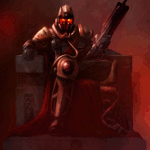|
JcDent posted:So, we watched 300 with my girlfriend (actually it's about 4th time for me) and I have some questions: 1. The simple answer is that the Spartans were professional soldiers and the other Greeks weren't. This is alluded to in the movie a few times. It's overly dramatic but the basic facts are true. Male Spartan citizens, which are a tiny minority of the population of Sparta, are raised from birth to be soldiers. They are better soldiers because they have the opportunity to train year-round, because their entire society is maintained by chattel slavery. Most of the time Sparta didn't march it's army too far because they were afraid their helots would revolt. 2. All fighting around this time is mostly a shoving match when it comes to actual hand-to-hand combat. I think the main difference that gave the Greeks an advantage was that they were predominantly a heavy infantry army. Armies in the near east tended to use linen and wicker, which are a lot more effective than they might sound, but still a disadvantage when you're up against a guy encased in bronze or iron. Another factor is that the Persians never used a phalanx formation, and never adopted it either, despite their sparabara being armed in a similar manner. Persian/Near Eastern warfare tended to revolve more around the use of light infantry, archers, and cavalry, none of which are particularly effective against a well organized block of heavy infantry. 3. Mostly light infantry, archers, and cavalry, probably. 4. They were better trained and more professional than most of the army. They could use bows, fight from horseback, or as infantry, and they did have slightly better armor (scale instead of leather or linen). Most importantly they were Persian, although I think they allowed Medes to serve eventually as well. An Achaemenid army would bring troops from satrapies all over the empire. From Anatolia, to Egypt, India, etc. Having a solid core of Persian troops to protect your Persian emperor is important with a lot of different guys floating around, some of potentially dubious loyalty. 5. The Macedonians used sarissas instead of spears. A sarissa is 16 feet long vs your average Greek hoplite who had a spear that was 7 or 8 feet long. Sarissas allows them to form a sort of pike block. There are more points that can be faced at the enemy at once and you have a longer reach. Ideally, it doesn't come down to a pushing match when you're talking about a Macedonian phalanx, because if someone gets past all the points of your sarissas, your guys are in trouble. 6. No, they were all very independent. The idea of a unified Greek identity is something comes up later. I mean, 50 years after Thermopylae you see Sparta allying with the Persian empire against Athens during the Peloponnesian War. Jamwad Hilder fucked around with this message at 21:44 on Feb 26, 2016 |
|
|
|

|
| # ? May 27, 2024 07:55 |
|
LLSix posted:For the best answers, cross post this into http://forums.somethingawful.com/showthread.php?threadid=3486446 Counterpoints: 1. Oh god no, the Spartans tried very hard to never ever ever ever arm the helots. At one point during their war with Athens they were facing a huge manpower problem (since they were so reliant on the elite of the elite) and they called for volunteers among the helots. They stabbed the first 2000 volunteers for being too eager to get their hands on weapons. There was a Spartan underclass of free but not large landowning who did fight along side the lifetime soldiers. 2. Depends. For one thing, Persian rulers and governors were more than happy to hire Greek mercenaries or draft Greeks from Greek cities within their borders, so you could have 'Persian' hoplites fighting Greek hoplites. The phalanx worked well for what it was but in many cases (e.g. the Ten Thousand) Persian superiority in cavalry meant a lot more. Even the Greeks knew that a phalanx could, for instance, be picked apart by skirmishers. I can think of two times that a bunch of Athenian peasants with javelins slaughtered trapped Spartans. Some further notes: Greek phalanxes weren't shoving matches, so far as we can tell. The primary goal was to put your spear into the other guy, not knock him over. The Macedonian innovation was to go full pikes (as is God's own way of making war) and bring in a real dedication to combined arms. Specifically, Alexander's famous heavy cavalry.
|
|
|
|
Do we actually have any Persian accounts of the battle? Or is everything from Herodotus? Edit: oops, very confused when Herodotus was around Fangz fucked around with this message at 22:05 on Feb 26, 2016 |
|
|
|
Fangz posted:Do we actually have any Persian accounts of the battle? Or is everything from Herodotus, 300 years later? Thermopylae was in his lifetime though...
|
|
|
|
the JJ posted:go full pikes (as is God's own way of making war)
|
|
|
|
JcDent posted:So, we watched 300 with my girlfriend (actually it's about 4th time for me) and I have some questions: The best part about thermopylae is that the film didn't make the silly oneliners like "Then we will fight in the shade!" up, they were in Herodotus.
|
|
|
|
JcDent posted:So, we watched 300 with my girlfriend (actually it's about 4th time for me) and I have some questions: These are short answers, obviously people have written entire books about each of them. 1. Better trained and equipped. Sparta utilized a caste system that included slaves to do most of the menial labor, so the warrior class was able to devote time to training and such. In general, the Spartans would have all had full panoply of chest armor made of bronze or linen (tough and hard, stuff hard to penetrate with bronze/early iron weapons), bronze helmet and greaves, and the large shield. 2. The shoving part is a bit of inaccuracy. The shoving matches did happen, but that was not the idea going into it. They gave them 9 foot long spears for a reason. The front line held their shields overlapping, with the spear held around the middle, going over the shield wall. Their buddies behind them could also stick their spears over their shoulders. The idea is to move within spear range of the enemy, and try and create holes in their line by nailing someone 2 ranks over in the side or the neck or whatever is open. If poo poo got crazy the front lines could get as close as shoving range, but that's not fun for anyone in the front as daggers would be coming out fast to start cutting throats. That's when a lot of people can die very fast. Someone even once did the math and if 2 full phalanxes truly just shoved with all their might, the dudes in middle would be crushed to death. So the shoving matches did happen, which is how we know about them, but that was not the goal at the start of the battle. The idea of the phalanx is to use your cohesion and discipline to inflict casualties without sustaining many yourself, especially against lesser trained and equipped foes. A full charge to try and break the enemy is more when the shoving matches happen intentionally, something the Spartans would be more willing to do then a lesser equipped army, trusting their armor to protect them. Stab one another and try and open some holes via casualties, and then shove your way through their line to break them if you sense they are wavering. 3.-4 The rank and file Persians would have had wicker shields (not like a wicker chair, much tougher then that, but obviously not as solid as wood), a standard 7-8 foot spear, a bow, a sword, and textile armor of some kind. The immortals would have had scale armor and the best quality equipment in general. They were also better trained and more capable in a fight, making them elite soldiers. Keep in mind the persian army was much more varied then the Greek one, and there were individual groups from various parts of the empire that were equipped much differently, but most were equipped as above. When fighting the Phalanx, they did not do well, at all. A major part of the story of the second invasion of Greece was the Persians underestimating Greek infantry and paying for it. The Greeks could hide behind their shields, helmets and leg armor and stab dudes at less risk to themselves and could outlast the Persian attacks. The Persians took heavy losses each time they tried to just straight up fight hoplites as they were just outgunned. 5. As stated above, the shoving match was not the intent of the phalanx, the idea was to have a solid shield wall that you could stab over, hurting the enemy while staying safe yourself. The Macedonian phalanx protects the individual spearman by giving him and all his friends a 18-21ft long pike instead of a 9 ft spear. 3-5 spearheads all stuck out in front of the first rank, so to get to that man, you had to dodge 3-5 men trying to stab you. A pike was a big, heavy weapon, and hit with a ton of force. There are accounts of Roman shields getting punctured straight through by Macedonian pike thrusts. So even if a hoplite phalanx had the balls to just try and advance right into the spear wall and absorb casualties, odds are they would not win the fight as a Macedonian phalanx was often 10 or more ranks deep, so even if that hoplite group kills a bunch of the front row, they keep getting more and more spears thrust at them, all while the front row draws swords to fight in close. The other thing to remember is the Macedonian phalanx was most successful with strong cavalry support, like Alexander's Companions. The phalanx slowly advances and can pin down enemy infantry, and heavy cavalry can flank the same force. Without that, you have what the Romans did, which was eventually outmaneuver them and flank them. Alexander's pikemen were also much better trained them his successors had the time or money to, and could move very fast when needed, complete with reorienting to handle a flanking attack in moments. WoodrowSkillson fucked around with this message at 22:11 on Feb 26, 2016 |
|
|
|
The Belgian posted:The best part about thermopylae is that the film didn't make the silly oneliners like "Then we will fight in the shade!" up, they were in Herodotus.
|
|
|
|
HEY GAL posted:did the Spartans invent the action-movie-oneliner, or did they merely perfect it As far as I can tell, Spartan society was just one big action movie (where they're the cartoonish villains who lose at the end), and there's a whole wikipedia page dedicated to their one-liners: https://en.wikipedia.org/wiki/Laconic_phrase My favorite being: quote:After invading southern Greece and receiving the submission of other key city-states, Philip II of Macedon sent a message to Sparta: "If I invade Laconia you will be destroyed, never to rise again." The Spartan ephors replied with a single word: "If" (αἴκα).[28] Subsequently neither Philip nor his son Alexander the Great attempted to capture the city. Google sources don't seem to agree on how Philip phrased his threat, I seem to remember it being longer and more specific in its violence but whatever, that's the gist of it.
|
|
|
|
Molon Labe
|
|
|
|
WoodrowSkillson posted:Molon Labe Or if you're in the US 'Moron Label' 
|
|
|
|
WoodrowSkillson posted:Molon Labe
|
|
|
One of my favorites is the stuff written on sling bullets.quote:Lucius Antonius the bald, and Fulvia, show us your rear end
|
|
|
|
|
LLSix posted:I have a vague memory that the vast majority of the veteran officials from the war with Mexico joined the South. That would have given them a significant edge in the early years. I was raised mostly in the South though so I'm not sure how true that is. Like Deteriorata said, most of the major figures on both sides had fought in Mexico. The Regular Army was especially important during Scott's campaign against Mexico City, so the majority of West Point grads took part. Sherman, stationed in California, was one of the few notables that didn't serve in Mexico. Most of the high brass from Mexico were either dead or nearly so when the Civil War started. Of the army's four general officers in 1860, Twiggs was the only one to go south. All four were dead or retired by 1864. Of the few colonels still active, most stayed with the North but only a couple saw active duty.
|
|
|
|
HEY GAL posted:did the Spartans invent the action-movie-oneliner, or did they merely perfect it Stuff in the old testament involving Samson has several excellent one-liners
|
|
|
|
WoodrowSkillson posted:These are short answers, obviously people have written entire books about each of them. Hang on, bronze armour in the Classical period? Are you sure? Edit: i guess so though surely bronze swords werent still a thing. feedmegin fucked around with this message at 23:33 on Feb 26, 2016 |
|
|
|
feedmegin posted:Hang on, bronze armour in the Classical period? Are you sure? It took a long time for the metallurgy of iron to catch up with bronze. Iron required a high-temperature furnace, was hard to work with, and took a lot of time and effort to produce a functioning piece of armor or weaponry. Bronze was well-understood and could be smelted in a pottery furnace over a wood fire, so lots of stuff could be made much more quickly and easily. Hence the amount of iron required to outfit an entire army was resource and cost prohibitive. Bronze was good enough for most purposes and survived a long time after iron appeared.
|
|
|
|
Deteriorata posted:Most of them on both sides had fought in it. Grant, Sherman, McClellan, Meade, Burnside and more from the Union army fought in it. Lee, Longstreet, Jackson, Bragg, Beauregard from the CSA. Thank you for correcting me. Fangz posted:Do we actually have any Persian accounts of the battle? Or is everything from Herodotus? I'm not an expert in this area, but I've never heard of any. This Iran Chamber Society website only cites Greek historians so I'm going to assume there aren't any surviving Persian records. FWIW, Herodotus was born in Turkey in a city that owed loyalty to the Persians.
|
|
|
|
http://store.steampowered.com/app/379980 The end state of wherabooism. The end state of wherabooism.
|
|
|
|
So who would win in a fight for gay black Hitler's heart, a Spartan phalanx or a block of 30YW pikemen?
|
|
|
|
A tank destroyer. Obviously. 
|
|
|
|
Klaus88 posted:http://store.steampowered.com/app/379980 Well, this was inevitable.
|
|
|
|
Just to add to the Greek warfare chat: it's worth pointing out that a significant number of Greeks fought on the side of the Persians. So it's not like the Greek world was even remotely unified in their defiance. The big thing about Thermopyle is that the Persians couldn't effectively use their cavalry, which is the best part of their army. You see something similar at Marathon where (from what I've heard) the Greeks attacked the Persian force before it could offload their horses and get them ready to fight. The difference is that the Greeks won at Marathon. For fairly obvious reasons the Persians preferred to hire their heavy infantry as mercenaries instead of develop their own. Which is why there are a lot of Greeks, particularly Peloponesians, that fought for Persian kings in later years. I might be mis-remembering, but I think a lot of these were pseduo-Spartan perioikoi who are a sort of half-citizen in Spartan society. And like other people have said the big innovation of the phalanx wasn't the phalanx it was the combined-arms approach that Alexander and Philip II used. This was described as a hammer-and-anvil where the phalanx (anvil) pins the enemy in place and then the cavalry (hammer) strike them. Alexander's phalanx commander had some harsh words for how Alexander abused his men and at one point accused Alexander of dicking around while the phalanx held out against overwhelming numbers. It should also be noted that the most important part of the Persian invasion of Greece was a naval battle. Once the Greeks won at Salamis the Persians started to lose faith in the war effort, Xerxes got back to Persia for a variety of reasons and left his son in charge, and their Greek allies were trying to find a way out. Then at Plataea the whole thing comes to decisive conclusion which is fortunate for the Greeks because their coalition is on the verge of collapsing. Despite this, the war drags on for a while longer as the Athenian led Delian League kicks the remainder of Persians out of Greece. The political fall-out from the whole war is actually pretty hilarious and involves the Athenian commander Themistocles being brought up on false charges of conspiring with the Persians (this is the guy was responsible for Salamis) so he flees to Persia and ends up eventually rising to a high position within the Persian court. One of the Spartan kings, Pausanias the commander at the battle of Plataea, is also accused of conspiring with Xerxes. This time it's actually somewhat true and Pausanias dies while evading arrest (he fled to a temple and they bricked up the entrance until he was on the verge of starving to death then carried him outside to die).
|
|
|
|
Come ON, now. What is so great about pikes?!? *runs and hides*
|
|
|
|
IM_DA_DECIDER posted:So who would win in a fight for gay black Hitler's heart, a Spartan phalanx or a block of 30YW pikemen? The spartans and pikemen have a raging argument about which is better, chiseled abs or juicy butts. They can both agree that big cocks are vulgar though. Hitler's black heart just sits there silently, somehow blaming all this on the jews.
|
|
|
|
Edit: my page didn't load much after the initial Greek warfare questions, so I missed the initial responses, but let's keep on ancient warfare for a while. I've read arguments that the pushing mentioned in battles may not have been literal, with it being more aggressive than previously thought, because why carry spears in if it's a scrum? Edit: It was thought that it was a literal scrum for a while, even a few years ago I remember arguing with ardent believes in it. Either this thread is ahead of the curve or it's a recent change. That would make a Macedonian Phalanx end up working as an area of denial weapon. It being difficult to make men remain organised when walking into the pike wall, which is what any phalanx requires. I reckon that the pike phalanx wasn't actually that much better than a hoplite phalanx, but it was more a change in culture. Macedonian pikemen were not the citizen soldier/farmers like hoplites, so an alternative to the full armour set was needed. Also a pike phalanx is a bit safer than a hoplite one if you're the anvil to a hammer. It's not one big blob of men, which could all lurch under a cavalry charge, you have a few feet of space for the most part, so you're at less risk of the enemy falling on top of you. Something to keep in mind is that for Alexander's campaign, the pikes were not alone or fighting hoplites. Skirmishers were picking apart formations and the hoplite-esque shield bearers were on the flanks to guard your sides and push in from the outside of possible. And half the problem of the successor states was nobody could get combined arms right anymore. So Rome won, as Rome tended to do, having the best military cultures of the time. Hazzard fucked around with this message at 02:10 on Feb 27, 2016 |
|
|
|
I'm glad to hear the shoving match explanation is losing it's popularity, since it never made sense to me. I don't think Hey Gal's guys shove each other, or any of the pre gunpowder armies we know about. It might happen, but it was never the goal. I do recall that as ancient Greek and Roman sources were rediscovered there were attempts to put into practice what they said, but I don't know that it ever worked out.
|
|
|
|
Ainsley McTree posted:As far as I can tell, Spartan society was just one big action movie (where they're the cartoonish villains...)
|
|
|
|
HEY GAL posted:not if you're a woman; Spartan women had it pretty good, comparitively "Why are you Spartan women the only ones who can rule men?" "Because we are also the only ones who give birth to men."
|
|
|
|
P-Mack posted:"Why are you Spartan women the only ones who can rule men?" i dunno, i feel a little long-winded there, you could probably lop some words off of those sentences and lose nothing
|
|
|
|
HEY GAL posted:not if you're a woman; Spartan women had it pretty good, comparitively The Athenians took that as a sign of weakness. What's next, treating women like people?
|
|
|
|
Don Gato posted:The Athenians took that as a sign of weakness. What's next, treating women like people?
|
|
|
|
MikeCrotch posted:The spartans and pikemen have a raging argument about which is better, chiseled abs or juicy butts. They can both agree that big cocks are vulgar though.
|
|
|
|
Most of what we know about Sparta was written by their enemies, so it makes sense for them to seem like the villains of an action movie. The whole women being well-treated thing was just points against them in the Athenian's eyes.
|
|
|
|
SlothfulCobra posted:Most of what we know about Sparta was written by their enemies, so it makes sense for them to seem like the villains of an action movie. unfortunately, people who had the kind of virtues the Spartans fostered tended not to write things down, so I don't think there's very much about Spartans by Spartans. We don't have any of their music either, I think for the same reason.
|
|
|
|
chitoryu12 posted:One of my favorites is the stuff written on sling bullets. The Greeks did this too. There's a fourth century BC example that simply reads "Catch!"
|
|
|
|
So, muster rolls. There's a dude who went crazy, plenty of people who deserted, and these guys: Jobst Steinnetze from Hermans-Acker, wanted to go home but he did not get there, whether he fell into the enemy's hands or was killed by peasants, nobody knows  Nicoll Möller, from Steinbach near Eyssenach, was supposed to have conveyed a horse from someone else back to Eisleben, but he rode away with it thereby, 5 July 1636 Godspeed Nicoll Möller. If Steinnetze has been waylaid by the Swedes or the French or whoever our enemy of the week is, he's probably fine. The alternative is...eh. I hope he just got lost or decided to get drunk instead of visiting his relatives or something. I'm interested in what the Steinnetze entry says about how these people operate--someone knew enough about where he was from, and was on good enough terms with whoever he had back home, to ask around once he went missing. Edit: JaucheCharly, if you like antiquated german, check out confoyren, "convey" HEY GUNS fucked around with this message at 06:48 on Feb 27, 2016 |
|
|
|
Klaus88 posted:http://store.steampowered.com/app/379980 These Hatoful Boyfriend knockoffs have gone too far.
|
|
|
|
GreyjoyBastard posted:These Hatoful Boyfriend knockoffs have gone too far. If it was a real Hatoful knockoff, you'd be macking on an actual T-34 who maybe has cat ears.
|
|
|
|

|
| # ? May 27, 2024 07:55 |
|
JcDent posted:If it was a real Hatoful knockoff, you'd be macking on an actual T-34 who maybe has cat ears. Not after that stupid ships as schoolgirls game came out.
|
|
|

































